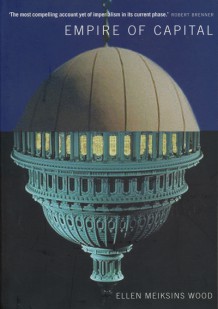

|
|

Empire of Capital
Wood, Ellen Meiksins
http://cominsitu.files.wordpress.com/2016/01/ellen-meiksins-wood-empire-of-capital.pdfhttp://www.connexions.org/CxLibrary/Docs/Ref52576-Ellen-Meiksins-Wood-Empire-of-Capital.pdf Publisher: Verso Year Published: 2003 Pages: 182pp ISBN: 1844675181 Resource Type: Book Cx Number: CX22829 Capitalism makes possible a new form of domination by purely economic means, argues Ellen Meiksins Wood. So, surely, even the most seasoned White House hawk would prefer to exercise global hegemony in this way, without costly colonial entanglements. Yet, as the author powerfully demonstates, the economic empire of capital has also created a new and unlimited militarism. Abstract: - Publisher's Description: Capitalism makes possible a new form of domination by purely economic means, argues Ellen Meiksins Wood. So, surely, even the most seasoned White House hawk would prefer to exercise global hegemony in this way, without costly colonial entanglements. Yet, as the author powerfully demonstates, the economic empire of capital has also created a new and unlimited militarism. By contrasting the new imperialism to historical forms such as the Roman and Spanish empires, and by tracing the development of capitalist imperialism back to the English domination of Ireland and on to the British Empire in America and India, Wood shows how today’s capitalist empire, a global economy administered by many local states, has come to spawn a new military doctrine of war without end, in purpose or time. Excerpt: Anyone who talks about US 'imperialism' is likely to be challenged on the grounds that the US does not directly rule or occupy a single country, anywhere in the world. And that, indeed, is the difficulty in characterizing the 'new' imperialism. While a few colonial pockets still exist, neither the US nor any other major Western power is today a colonial empire in direct command of vast subject territories. Although the US has a military presence in about 140 countries, it cannot even be said that imperial power unambiguously imposes its rule through the medium of puppet regimes kept in place by imperial military power. Nor, for that matter, is there anything today like the commercial empires that once prevailed because they commanded trade routes by means of superior force or more advanced naval technology. There was a time when not only colonial rule but economic exploitation of colonies by imperial powers was a fairly transparent business. Anyone observing the Spanish in South America, or, later, the Belgians in the Congo, would have had no difficulty understanding the means by which the wealth of the subject was being transferred to the master. In that respect, traditional imperialism had much in common with certain domestic class relations. Just as there was nothing particularly opaque about the relationship between feudal lords and the peasants whose labour services or rents they appropriated, or between the absolutist state and the peasants whose taxes it extracted, the relationship between colonial masters and their subjects was reasonably clear: the one exerted the force, up to and including genocide, that compelled the others to forfeit their wealth. In modern capitalism, the class relation between capital and labour is rather more difficult to decipher. Here, there is no direct transfer of surplus labour. The workers pay no rent, no tax or tribute, to their employers. There is no obvious way of distinguishing between what workers keep for themselves and what they forfeit to capital. In fact, far from extracting rent from workers, the employer pays them, in the form of a wage, and that payment appears to cover all the work the worker performs: eight hours' pay, for instance, for eight hours' work. It is not so easy to unravel how the workers create the wealth of capital by means of labour for which they receive no recompense, or, to put it another way, how capital derives more benefit, in the form of profit, from the workers' labour than the workers receive in exchange in the form of a wage. It may be self- evident to any reasonable person that capital accumulation could not take place without a net transfer of surplus labour from workers to capitalists, but how this comes about is far less clear. The Marxist theory of surplus value is a persuasive account of how this transfer takes place, but the fact that such a complex theory is required to explain what ought to be a fairly straightforward transaction testifies to the opacity of the relation between capital and labour. ... Today, it is harder than it was in earlier colonial empires to detect the transfer of wealth from weaker to stronger nations. But even when it is painfully obvious that such a transfer is taking place, how it is accomplished is no less opaque than the relation between capital and labour, and this opacity leaves a great deal of room for denial. Here, too, there is typically no relationship of direct coercion. Here, too, the compulsions are likely to be 'economic', imposed not (directly) by masters but by markets. Here, too, the only formally recognized relationship is between legally free and equal entities, such as buyers and sellers, lenders and borrowers, or even ostensibly sovereign states. What makes class domination or imperialism specifically capitalistis the predominance of economic, as distinct from direct 'extra-economic' - political, military, judicial - coercion. Yet this certainly does not mean that capitalist imperialism can dispense with extra-economic force. Subject Headings
|